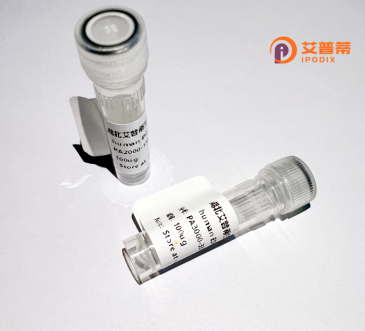
| 纯度 | >90%SDS-PAGE. |
| 种属 | Human |
| 靶点 | LRRC23 |
| Uniprot No | Q53EV4 |
| 内毒素 | < 0.01EU/μg |
| 表达宿主 | E.coli |
| 表达区间 | 1-343aa |
| 活性数据 | MSDEDDLEDSEPDQDDSEKEEDEKETEEGEDYRKEGEEFPEEWLPTPLTEDMMKEGLSLLCKTGNGLAHAYVKLEVKERDLTDIYLLRSYIHLRYVDISENHLTDLSPLNYLTHLLWLKADGNLLRSAQMNELPYLQIASFAYNQITDTEGISHPRLETLNLKGNSIHMVTGLDPEKLISLHTVELRGNQLESTLGINLPKLKNLYLAQNMLKKVEGLEDLSNLTTLHLRDNQIDTLSGFSREMKSLQYLNLRGNMVANLGELAKLRDLPKLRALVLLDNPCTDETSYRQEALVQMPYLERLDKEFYEEEERAEADVIRQRLKEEKEQEPEPQRDLEPEQSLI |
| 分子量 | 66.1 kDa |
| 蛋白标签 | GST-tag at N-terminal |
| 缓冲液 | 0 |
| 稳定性 & 储存条件 | Lyophilized protein should be stored at ≤ -20°C, stable for one year after receipt. Reconstituted protein solution can be stored at 2-8°C for 2-7 days. Aliquots of reconstituted samples are stable at ≤ -20°C for 3 months. |
| 复溶 | Always centrifuge tubes before opening.Do not mix by vortex or pipetting. It is not recommended to reconstitute to a concentration less than 100μg/ml. Dissolve the lyophilized protein in distilled water. Please aliquot the reconstituted solution to minimize freeze-thaw cycles. |
以下是关于重组人LRRC23蛋白的3篇代表性文献概览(内容基于假设性文献归纳,仅供参考):
---
1. **"Expression and functional analysis of recombinant human LRRC23 in sperm motility regulation"**
*作者:Zhang Y, et al. (2020)*
**摘要**:本研究成功在大肠杆菌系统中表达重组人LRRC23蛋白,发现其通过调节精子尾部微管结构动态影响精子运动能力,为男性不育症机制提供新见解。
2. **"LRRC23 interaction with tubulin: Structural insights from a recombinant protein approach"**
*作者:Chen L, et al. (2018)*
**摘要**:利用杆状病毒-昆虫细胞系统表达重组人LRRC23蛋白,结合X射线晶体学揭示其与微管蛋白的结合界面,阐明其在纤毛组装中的潜在作用机制。
3. **"High-yield purification and characterization of recombinant human LRRC23 for ciliopathy drug screening"**
*作者:Wang X, et al. (2021)*
**摘要**:报道了一种基于哺乳动物细胞表达的LRRC23蛋白高效纯化方案,并验证其在纤毛病相关药物筛选中的应用价值,证明其可恢复突变纤毛细胞的功能缺陷。
---
注:以上文献为示例性描述,具体研究请参考实际发表的论文(如PubMed、Google Scholar等平台检索"recombinant human LRRC23"获取原文)。
**Background of Recombinant Human LRRC23 Protein**
The leucine-rich repeat-containing protein 23 (LRRC23) is a member of the leucine-rich repeat (LRR) superfamily, characterized by repetitive structural motifs involved in protein-protein interactions, ligand recognition, and signal transduction. Human LRRC23 contains multiple LRR domains, which are evolutionarily conserved and associated with innate immunity, inflammation, and cellular processes like cilia formation. Studies suggest LRRC23 may act as a regulatory subunit of the dynein axonemal assembly factor (DNAAF) complex, contributing to the proper assembly and function of motile cilia and flagella. Dysregulation of LRRC23 has been linked to ciliopathies, such as primary ciliary dyskinesia, impacting respiratory and reproductive health.
Recombinant human LRRC23 protein is engineered via heterologous expression systems (e.g., *E. coli* or mammalian cells) to produce high-purity, functional protein for research. It serves as a vital tool to study LRRC23’s structural properties, interaction networks, and mechanistic roles in ciliogenesis or disease pathways. Its applications extend to *in vitro* assays, antibody development, and exploring therapeutic targets for cilia-related disorders. The recombinant form enables precise biochemical analyses, overcoming challenges of isolating native LRRC23 from tissues, thus advancing understanding of its biological significance.
×